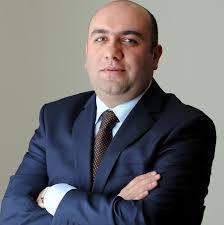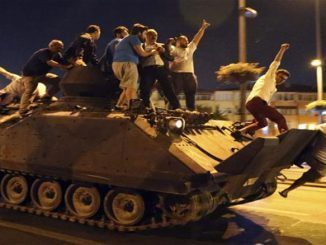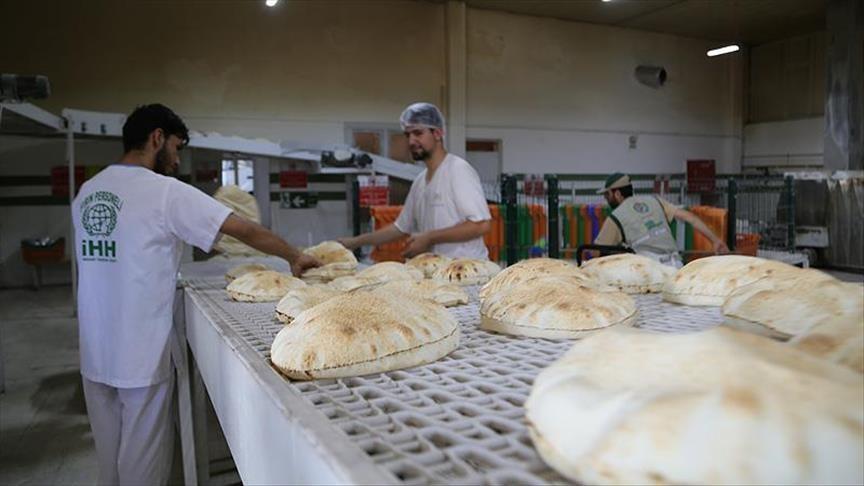
By: Çetiner Çetin*
Turkey has survived one of the most interesting coup attempts of its history. It seems Turkey has significantly overcome the coup attempt which was masterminded by the Gülenist Terrorist Organization (FETÖ) [or the Parallel State Structuring (PDY)] in order to first seize the military and then the political power as two groups, which were illegally organized within the Turkish Armed Forces (TSK). For some, the process is not yet over, but the most critical hours were overcome.
Indeed, the FETÖ, which waged a war on the state, failed in its two previous coup attempts. First was an operation against National Intelligence Organization (MİT) Head Hakan Fidan on Feb. 7, 2012. Back then, despite being more influential in the state, they preferred to carry out a narrower-scope operation and aimed to first seize MİT head and then topple the then Prime Minister, current President Recep Tayyip Erdoğan, by turning the judiciary into an instrument.
The process, which was eluded through Fidan and Erdoğan’s stratagems, brought the relation between the government and the FETÖ to another dimension. The FETÖ took its second and bigger step on Dec. 17 and Dec. 25, 2013. This time, it launched a direct operation against Erdoğan and his close circle of family and cronies. Again, it was inclined to topple Erdoğan by turning the judiciary and social chaos into an instrument. However, this attempt was also foiled through some rigid measures. It was an unprecedented coup attempt. Indeed, the process was operated as if it had been a legal one by using the mass media in an attempt to eliminate the perception of a coup. Therefore, many preferred not to call the incident a coup. However, all these happenings indicate to what extent judges were involved in the process following the first wave of the coup attempt.
As the coup plot which was implemented on the night of July 15 would fail to seize the whole Turkey, it just focused on the most important places and paralyzing transport. If you cannot seize the whole country and deploy soldiers in each street, you focus on the most important centers there. Certainly, these were Ankara and Istanbul on that night, with the former being the point target which would determine the coup’s ultimate success, and the latter being a proper target to be paralyzed. For this very reason, coup plotters simultaneously tried to paralyze Istanbul and seize strategic institutions in Ankara. In other words, aware of their power, they had very well done their homework.
After it became clear that FETÖ-led military officers were the perpetrators of the failed military coup attempt, what we have on the agenda is that some foreign powers had a hand in the incident and that they were aware of it. Sometimes, U.S. authorities’ attempts to seem innocent of such suspicions and accusations become ridiculous. In addition to their media moves to manipulate the perception inside the country, the American media published quite interesting news reports.
INFORMATION POLLUTION
One of these examples is Ali Watkins’ report on Buzzfeed. The piece titled “Inside The Nine Hours In Turkey That Left Washington Shaken” tries to convince readers that putschists strove to call General Joseph Dunford, chairman of the Joint Chiefs of Staff, with Turkish Chief of General Staff Hulusi Akar’s phone, however, his staff did not want to wake him.
This is where the comedy begins. It seemed that coup plotters tried to contact Dunford to receive his support. When Dunford’s office staff answered their phone and hung up on them, Dunford was in Afghanistan. The piece is extremely funny and unreliable.
Soon after that report was published, Dunford’s office issued quite an interesting statement. According to the statement, when Dunford was informed that the call to his office in Washington was from Akar, he was awake in Afghanistan. This answer does not go beyond a half-baked sentence which means that Dunford is informed even when he is not awake. So, the second part of the comedy is that they want to convince us that he did not hold a phone conversation.
A group in the Turkish Army, which is the second largest power in NATO, tried to subvert the legal order, but the U.S. chairman of the Joint Chiefs of Staff did not want to speak to them on the phone! Moreover, the report says this was how the U.S. heard about the coup attempt in Turkey. In sum, the U.S. tries to evade by saying that they did not hear about the coup attempt and take the putschists as an addressee.
Many readers are preoccupied with the question of what time this so-called telephone conversation was held with coup plotters. The same question is the key information to understand the incident. They remind us that there is only one and a half hours of time difference between Turkey and Kabul (Afghanistan). I do not care about the time of the telephone call, as their statement is aimed at convincing us that no telephone conversation was held.
AMBASSADOR OF WHERE?
The West is slowly but surely switching to a state of “damage assessment.” But, I must note that this is quite e belated move. During a recent interview with Turkish daily Hürriyet, Richard Moore, British Ambassador to Ankara, said that the U.S. and its army, intelligence organizations and NATO, all of which tried to localize the coup plot and present the incidents merely as a local problem of Turkey, did not have information about the coup and were not behind the attempt. Then, let us ask: Mr. Moore, are you the ambassador of the U.S. or the U.K.?
Moreover, Moore said that he did not have difficulty accepting the government’s statement that Gülenists perpetrated the coup attempt, adding that a detailed examination of the evidence which has so far come to the light seems quite a convincing situation. He also stated the organization members even infiltrated the Turkish army and what happened was not a “surprise.” Now that you see that Fethullah Gülen is a terrorist, then why do not think about repatriating 1,103 individuals who have taken refuge in the U.K. with their families for the past two years? For instance, one of them is Talip Büyük, the FETÖ’s former so-called imam in Iraq. He lives in your country at the moment and is one of the most dangerous figures in the organization.
Moore noted the U.S. was not absolutely behind the coup, continuing that some publications released after the coup attempt were rather foolish and malevolent. I am sure that this kind of statement will be continuously repeated by different Western authorities and the U.S. will soon come to sacrifice its years-long project, Fethullah Gülen, in return for good relations with Turkey.
I would like to note the questions of whether the U.S., NATO and other allies were informed about all this and whether they had a part in the incident will not be forgotten. We need to be very careful while asking these questions. Instead of directly asking them as some Turkish authorities did, we must ask in a tone in line with the international law.
In response to a question about Turkey’s relations with the U.S. and NATO during Al Jazeera International’s interview, Erdoğan said that relations were on a good level and they strive to minimize speculations. This is because there are some diplomatic issues which cannot be discussed before the cameras.
Ten days later, Erdoğan’s conciliatory approach faced extremely undiplomatic statements from U.S. military and intelligence circles. During a security forum in Colorado on July 28, Joseph Votel, the Commander of the U.S. Central Command, said the U.S. had allies within the Turkish army to fight DAESH, adding that post-coup arrests might affect the level of cooperation between Turkey and the U.S. He also voiced his concerns about the arrested military officers and coup makers, instead of about Turkey’s constitutional order. U.S. National Intelligence Director James Clapper also stood out with a similar statement. As a result of Erdoğan’s harsh response, saying that “it is none of your business to criticize us,” Pentagon stated that “Commander Votel did not mean that.” Obviously, however, the U.S. did not utter a single world condemning the coup attempt.
This problem of indifference that Turkey experiences with the U.S. and EU not only concerns the FETÖ, but also the Syria policy which has grown into an element of domestic security question for Turkey. Over the past year, PKK and DAESH terrorist organizations have led to the death of hundreds of people through explosions in Turkish metropolises. Although they do not take up a clear stance on these terrorist acts, they ally with the Democratic Union Party (PYD), the Syrian branch of the PKK. They mask this malevolent alliance under the cloak of counterterrorism.
The 1979 agreement between Turkey and the U.S. on extradition principally stipulates the U.S. to extradite individuals who are behind crimes, such as murder, conspiracy and assassination of the head of state – Erdoğan. However, the devil is in the detail. As usual, there is an “exception” with respect to criminals in this extradition agreement. This means the U.S. can reject the extradition request when it finds that evidence offered with respect to a crime includes a political motivation. Nearly 300 Turkish citizens were killed and some 1,400 were injured during the coup attempt. Erdoğan declared a state of emergency, as a result of which thousands of Gülen’s supporters were arrested and tens of thousands of staff in the state, judiciary and media outlets were either temporarily sidelined or dismissed.
Turkey needs to first convince U.S. attorney generals and then a federal court in Pennsylvania about evidence validity. It might also need to struggle in a higher federal court of appeal. U.S. Secretary of State John Kerry might still evaluate the extradition request and block it. However, it might be too little too late to restore Turkey-U.S. relations when the documents reach Kerry’s office. In fact, the U.S. and Britain divert attention and accusations to others by putting forward some other issues, such as the argument that Palestinian Mohammed Dahlan, who has relations with the UAE, financed the coup. By doing so, they try to affect Turkey-Gulf relations.
The military coup gave a historic opportunity to Erdoğan to reshape the existing situation and revise the foreign policy. So far, it has been seen that Erdoğan might renounce the alliance with the West unless it fulfills Turkey’s requests and he is resolute on tending toward Russia. Now, the Western world, especially the U.S., which has hypocritical attitude on the PKK, DAESH and FETÖ, must revise its plans. Will they move with the friendly and ally Turkey, or introduce a greater trouble to the world by nourishing terrorists?
*Çetiner Çetin is a Turkish journalist. He wrote this article exclusively for MEO



